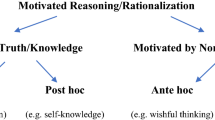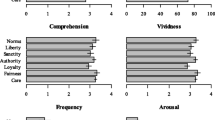Abstract
We accomplish three things in this paper. First, we provide evidence that the motivational internalism/externalism debate in moral psychology could be a false dichotomy born of ambiguity. Second, we provide further evidence for a crucial distinction between two different categories of belief in folk psychology: thick belief and thin belief. Third, we demonstrate how careful attention to deep features of folk psychology can help diagnose and defuse seemingly intractable philosophical disagreement in metaethics.



Similar content being viewed by others
Notes
For example, it’s not clear that we made Michael abnormal or irrational in the second half of the story. Rather, as Stocker put the point, such a “course of life” seems “typical” (1979, p. 741).
Gendler (2008a, b) draws an orthogonal distinction between ‘belief’ and ‘alief’. Further work is required to determine whether this interacts with our classification of thick and thin belief. For how the alief/belief distinction might bear on moral motivation and moral phenomenology, see Kriegel (2012). For yet another theoretical account of the different psychological states that might be implicated in the debate between internalists and externalists see Kauppinen (2015).
Buckwalter et al. (2015) replicate this effect for thick and thin belief across several experiments using a number of different cover-stories.
For a similar and insightful conceptual move in the debate about free will see May (2014).
Theorizing about the nature of verbal disputes must be saved for another occasion. See Chalmers (2011, p. 522) for one general working definition that “a dispute over S is (broadly) verbal when for some expression T in S, the parties disagree about the meaning of T, and the dispute over S arises wholly in virtue of this disagreement regarding T.”
If we weren’t joining an ongoing controversy in medias res, we would use different, simpler cases. Part of the reason, as we discuss below, is that certain details of Stocker’s original politician case suggest that it is not a fair test of internalism.
As with the experiments reported below, participants were recruited using Amazon Mechanical Turk, tested online using Qualtrics survey software, and compensated $0.15 for approximately 2–3 min of their time. Participants were not allowed to re-take any survey reported here, and participants who had taken previous similar surveys were excluded by their AMT Worker ID. Participants were located in the United States. Preliminary analysis revealed no effects of participant age or gender on the dependent variables, so the analyses that follow collapse across those demographic variables. The same is true in all the other experiments reported in this paper.
Seven participants were removed from the analysis for failing a comprehension question.
In order to employ more powerful statistical tests to detect patterns in belief ascription, we also created a belief-confidence measure. This measure took answers given to the dichotomous belief questions and combined them with scalar confidence judgments (e.g. “How confident are you in the answer you just gave to the previous question?”). Using this more sensitive measure, we detected the same pattern of results reported on dichotomous scales throughout the paper and, thus, omit these analyses for simplicity.
Dreier (1990, p. 12) notes a similar point when he writes of Stocker’s original politician case that being asked to imagine a person who “would not lift a finger, as it were, to achieve what he believes to be good” would “strain our imaginative power.”
One participant was removed from the analysis for answering that the protagonist “still has some” motivation for helping the poor.
Three participants were removed from the analysis for failing comprehension or motivation checks in Experiment 3.
We credit an anonymous referee for raising this objection.
Three participants were removed from the analysis for failing comprehension or motivation checks in Experiment 4.
Insofar as participants’ judgments about the possibility of moral requirements in Strandberg and Björklund’s experiments serve as proxy for sincere moral judgments in our own.
To that extent our discussion assumes that philosophers are people too and, thus, aren’t immune to the influence of folk psychology. For similar results to this effect see Vaesen et al. (2013) suggesting that epistemic intuitions of professional epistemologists are sensitive to native language, and results by Schulz et al. (2011) suggesting that certain personality differences among experts predict intuitions about free will and moral responsibility. For studies involving heuristics and biases among professionals see Machery (2012); Schwitzgebel and Cushman (2012, 2015); Knobe and Samuels (2013); Tobia et al. (2013).
For more on the role of assertion in demarcating categories of thick and thin belief see Rose et al. (2014).
References
Armstrong, D. 1969. Does knowledge entail belief? Proceedings of the Aristotelian Society 70: 21–36.
Björklund, F., G. Björnsson, J. Eriksson, R. Francén Olinder, and Caj Strandberg. 2012. Recent work on motivational internalism. Analysis 72(1): 124–137.
Blackburn, S. 1984. Spreading the word. Oxford: Oxford University Press.
Blackburn, S. 1998. Ruling passions, 59–68. Oxford: Clarendon.
Brink, D. 1989. Moral realism and the foundations of ethics. Cambridge: Cambridge University Press.
Brink, D. 1997. Moral motivation. Ethics 108: 4–32.
Buckwalter, W., D. Rose, and J. Turri. 2015. Belief through thick and thin. Noûs 49(4): 748–775.
Buckwalter, W., and J. Turri. forthcoming. Moderate scientism in philosophy. Forthcoming in Scientism: prospects and problems. In eds. de Ridder, J., Peels, R., and von Woudenberg, R. Oxford University Press.
Chalmers, D.J. 2011. Verbal disputes. Philosophical Review 120(4): 515–566.
Cohen, J. 1966. More about knowing and feeling sure. Analysis 27: 11–16.
Copp, D. 1997. Belief, reason, and motivation: Michael Smith’s the moral problem. Ethics 108: 33–54.
Dreier, J. 1990. Internalism and speaker relativism. Ethics 101: 6–26.
Dreier, J. 2006. Moral relativism and moral nihilism. In Oxford handbook of ethical theory, ed. D. Copp, 240–264. New York: Oxford University Press.
Dretske, F. 1983. The epistemology of belief. Synthese 55(1): 3–19.
Falk, W.D. 1947. “Ought” and motivation. Proceedings of the Aristotelian Society 48: 111–138.
Fodor, J.A. 1990. A theory of content. Cambridge: MA. MIT Press.
Gendler, T.S. 2008a. Alief and belief. Journal of Philosophy 105(10): 634–663.
Gendler, T.S. 2008b. Alief in action (and reaction). Mind & Language 23(5): 552–585.
Hume, D. 1748 [1977]. In An enquiry concerning human understanding, (2nd ed.), ed. E. Steinberg. Indianapolis: Hackett.
Hume, D. 1772 [1992]. Of the dignity or meanness of human nature. In Essays and Treatises on Several Subjects. London: Basil.
Hume, D. 1779 [2007]. Dialogues concerning natural religion. Ann Arbor: University of Michigan Library. URL<http://name.umdl.umich.edu/004895521.0001.000>.
James, W. 1889. The psychology of belief. Mind 14(55): 321–352.
Jones, O.R. 1971. Knowing and guessing: By examples. Analysis 32: 19–23.
Kauppinen, A. 2015. Intuition and belief in moral motivation. In Moral internalism, ed. G. Björnsson, C. Strandberg, R.F. Olinder, J. Eriksson, and F. Björklund. Oxford: Oxford University Press.
Knobe, J., and R. Samuels. 2013. Thinking like a scientist: Innateness as a case study. Cognition 126: 72–86.
Korsgaard, C.M. 1996. The sources of normativity. Cambridge: Cambridge UP.
Kriegel, U. 2012. Moral motivation, moral phenomenology, and the alief/ belief distinction. Australasian Journal of Philosophy 90(3): 469–486.
Leher, K. 1974. Knowledge. Oxford: Clarendon.
Machery, E. 2012. Expertise and intuitions about reference. Theoria 73: 37–54.
Mackie, J. 1977. Ethics: Inventing right and wrong. New York: Penguin.
May, J. 2014. On the very concept of free will. Synthese 191(12): 2849–2866.
Mele, A. 1996. Internalist moral cognitivism and listlessness. Ethics 106: 727–753.
Miller, A. 2003. An introduction to contemporary metaethics. Cambridge: Polity Press.
Murray, D., J. Sytsma, and J. Livengood. 2013. God knows (but does God believe?). Philosophical Studies 166(1): 83–107.
Myers-Schulz, B., and E. Schwitzgebel. 2013. Knowing that P without believing that P. Noûs 47(2): 371–384.
Nichols, S. 2002. On the genealogy of norms: A case for the role of emotion in cultural evolution. Philosophy of Science 69: 234–255.
Nichols, S. 2004. Sentimental rules: On the natural foundations of moral judgment. Oxford: Oxford University Press.
Peirce, C.S. 1958. In Collected papers of Charles Sanders Peirce, ed. Charles Hartshorne, Paul Weiss, and Arthur W. Burks. Cambridge: Harvard University Press.
Radford, C. 1966. Knowledge — by examples. Analysis 27: 1–11.
Railton, P. 1986. Moral realism. Philosophical Review 95: 163–207.
Rosati, Connie S. 2006. Moral motivation. In The stanford encyclopedia of philosophy, (Fall 2008 Edition), ed. Edward N. Zalta. URL = <http://plato.stanford.edu/archives/fall2008/entries/moral-motivation/>.
Rose, D., W. Buckwalter, and J. Turri. 2014. When words speak louder than actions: Delusion, belief and the power of assertion. Australasian Journal of Philosophy 92(4): 683–700.
Roskies, A. 2003. Are ethical judgments intrinsically motivational? Lessons from ‘acquired sociopathy’. Philosophical Psychology 16: 51–66.
Roskies, A. 2006. Patients with ventromedial frontal damage have moral beliefs. Philosophical Psychology 19: 617–627.
Roskies, A. 2008. Internalism and the evidence from pathology. In Moral psychology, vol. 3, ed. W. Sinnott-Armstrong, 191–206. Cambridge: The MIT Press.
Rose, D., and J. Schaffer. 2013. Knowledge entails dispositional belief. Philosophical Studies 166(1): 19–50.
Sayre-McCord, G. 1997. The metaethical problem. Ethics 108: 55–83.
Schulz, E., E.T. Cokely, and A. Feltz. 2011. Persistent bias in expert judgments about free will and moral responsibility: A test of the expertise defense. Consciousness and Cognition 20: 1722–1731.
Schwitzgebel, E., and F. Cushman. 2012. Expertise in moral reasoning? Order effects on moral judgment in professional philosophers and non-philosophers. Mind & Language 27: 135–153.
Schwitzgebel, E., and F. Cushman. 2015. Philosophers’ biased judgments persist despite training, expertise and reflection. Cognition 141: 127–137.
Shafer-Landau, R. 2003. Moral realism. A defence. Oxford: Clarendon.
Smith, M. 1994. The moral problem. Oxford: Basil Blackwell.
Stocker, M. 1979. Desiring the bad: an essay in moral psychology. The Journal of Philosophy 76: 738–753.
Strandberg, C., and F. Björklund. 2013. Is moral internalism supported by folk intuitions? Philosophical Psychology 26(3): 319–335.
Svavarsdottir, S. 1999. Moral cognitivism and motivation. The Philosophical Review 108: 161–219.
Tobia, K., W. Buckwalter, and S. Stich. 2013. Moral intuitions: Are philosophers experts? Philosophical Psychology 26(5): 629–638.
Vaesen, K., M. Peterson, and B.V. Bezooijen. 2013. The reliability of armchair intuitions. Metaphilosophy 44(5): 559–578.
Williams, D.C. 1937. The meaning of ‘good’. Philosophical Review 46(4): 416–423.
Zangwill, N. 2008. The indifference argument. Philosophical Studies 138: 91–124.
Author information
Authors and Affiliations
Corresponding author
Rights and permissions
About this article
Cite this article
Buckwalter, W., Turri, J. In the Thick of Moral Motivation. Rev.Phil.Psych. 8, 433–453 (2017). https://doi.org/10.1007/s13164-016-0306-3
Published:
Issue Date:
DOI: https://doi.org/10.1007/s13164-016-0306-3




